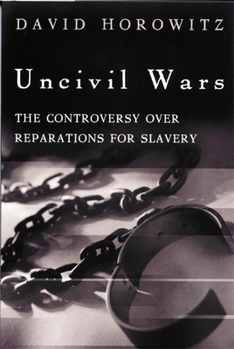Uncivil Wars: The Controversy over Reparations for Slavery
Select Format
Select Condition 
Book Overview
The idea that taxpayers should pay reparations to African Americans for the damages of slavery and segregation is quickly becoming a central demand of some civil rights leaders. It has the backing of... This description may be from another edition of this product.
Format:Hardcover
Language:English
ISBN:1893554449
ISBN13:9781893554443
Release Date:December 2001
Publisher:Encounter Books
Length:139 Pages
Weight:1.00 lbs.
Dimensions:0.7" x 6.3" x 9.3"
Related Subjects
African-American Studies Americas Civil Rights & Liberties Constitutional Law Discrimination & Racism Education & Reference Law Minority Studies Political Science Politics & Government Politics & Social Sciences Race Relations Social Science Social Sciences Specific Demographics Specific TopicsCustomer Reviews
4 ratings
The startling truth...
Published by Thriftbooks.com User , 23 years ago
Many of us sit back and enjoy the world through the prism of another's eyes. All too often this is the case with America's age-old racial conflict. We are told how bad the situation used to be, and it was quite terrible for all who experienced the days of Jim Crow and the fight to resist him. We are told by much of today's commentators that we have not come very far in this fight and how white America is still oppressing their neighbors with tenacious, overt hatred. And this despite the fact that most American's today identify with a much more egalitarian American society. Horowitz's book poses a succinct, common sense argument against reparations for slavery. He delves sufficiently into several precedents, showing how each is inapplicable to this case, and finishes with the very correct conclusion that American tax payers owe nothing but kindness and brotherly respect to those around us. Read this book for an insightful look at the reparations debate.
Horowitz always has his facts straight
Published by Thriftbooks.com User , 23 years ago
As an accomplished and voracious reader, I judge any book (and thus also judge the author) by its "readability", "relevance", and "reliability". The best reading most enjoying text is essentially worthless if the topic is irrelevant, or if the writer is unreliable. Conversely, a highly reliable and perfectly relevant piece is of equally little value if it has the readability of a parts assembly guide. To my positive delight I recently discovered that David Horowitz's work more than meets my criteria in this regard. I find everything that he writes to have been well researched and eminently factual; and at the same time highly readable, thoroughly enjoyable. Uncivil Wars is no exception. Count on Mr. Horowitz to pull no punches in his relentless presentation of painful truths.
Nobody can reasonably oppose slavery reparations...
Published by Thriftbooks.com User , 23 years ago
...unfortunately, all slaves and their former masters are dead. Demagogues like Cornell West base their demand for payout on fallacious and ridiculous arguments that defy reason and logic. Forcing the current population of Americans to pay for the sins of people that lived over 150 years ago is not the triumph of morality, it is the negation of morality, holding people responsible for acts that not only weren't committed by them, but weren't even committed by any of their ancestors. (We are an immigrant nation, after all.) To argue that people who had no part whatsoever in slavery are morally responsible requires such intellectual contortions as would confound any psychologist. David Horowitz has provided a public service with this book, both by exposing both the fraud of the reparations movement, and the intellectual dry-rot that has infected an academia that would support such a proposition and engage in browshirted tactics to try to silence any opposition to it.
A must read for the open-minded
Published by Thriftbooks.com User , 23 years ago
In this book, conservative commentator David Horowitz actually fights two fronts in he liberal-conservative "culture war".One is the idea of race reparations for slavery, the other, the entrenched leftist ideology of the modern American university. Horowitz began his battle by formulating "Ten Reasons Why Reparations for Slavery Is A Bad Idea--And Racist, Too" and sent it to 71 college newspapers nationwide in the form of an advertisement. The first half of the book deals mainly with reaction to the ad on college campuses. Horowitz details the reaction of university student newspaper editors, profeessors and administrators at places such as UC Berkeley, The University of Wisconsin at Madison, and Brown University. Here, Horowitz tells a chilling, frightening account of the kind of censorship attempted by the far left-of-center campus "commisars". This section is an eye-opener for those who still believe that our American universities are centers for the free exchange of ideas. The section on Brown University, and the lengths that some of the students would go to to suppress the ad is particularly disturbing.The last sections of the book are mainly devoted to the idea of reaparations for slavery itself. The idea itself has been floating around for many years, but has gained monmentum in the last decade due to the publication of the bestselling book "The Debt" by black activist Randall Robinson as well as the formal adoption of the reparations concept by the city councils of several US population centers including Chicago, Los Angeles, and Dallas. Horowitz gives a reasoned,well-researched refutation of the reaparations concept which leaves one wondering what the folks populating the campi were worried about. Could they be afraid of the truth? Buy this book. It is an essential part of the debate on an issue that will continue to be part of the American landscape, and a revelation to those who seek the truth.





